Russia, Iran, China Likely To Influence US 2024 Vote, Microsoft Warns

Microsoft warned that Russia, Iran, and China are likely to plan to influence the upcoming elections in the United States and other countries in 2024.

Microsoft warned that Russia, Iran, and China are likely to plan to influence the upcoming elections in the United States and other countries in 2024.
In a report released by Microsoft's Threat Analysis Center (MTAC) on November 8, it was stated that “election infrastructure, campaigns, and voters” are expected to be targeted by “authoritarian regimes.”
The 2024 US presidential election is of grave importance to such countries as Russia, Iran and China as it will define Washington’s future foreign policy with regard to several major conflicts on the global stage, added the report entitled “Protecting Election 2024 from foreign malign influence.”
The report referred to the Ukraine war, the conflict in Gaza, and China’s mounting aggressiveness towards Taiwan, predicting that “authoritarian nation states” will try to influence the next year US election “to advance their strategic goals.”
Russia “remains the most committed and capable threat” to the upcoming presidential election, Microsoft analytical survey warned.
According to the report, before 2016 and 2020 US elections, there was “account positioning and messaging designed to sway audiences across the political spectrum in hopes of influencing the nominee result in each political party before the general election.”
Though the 2022 US midterm elections were held without “impactful cyber or influence operations from Russia, Iran, or China,” it has been observed over the recent weeks that Moscow has been slowly accelerating its influence operations, the report stated.
Microsoft's Threat Analysis Center also confirmed that Iran has intensified its cyberattacks and influence operations since 2020, targeting Israel and Bahrain, for instance.
“Microsoft remains committed to protecting democratic elections, and we’ve outlined our principles for safeguarding elections and democratic institutions in the era of AI,” the report stressed.
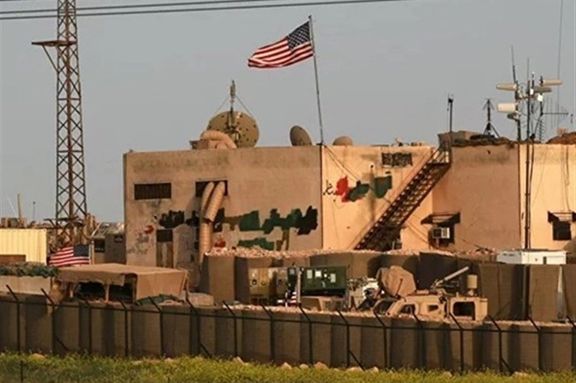
The US military strikes in Syria are aimed at destroying weaponry and deterring Iranian-backed groups from targeting American troops, the White House said on Thursday.
The United States carried out strikes in early hours of Thursday local time against a weapon storage facility in eastern Syria that the Pentagon said was used by Iran's Islamic Revolutionary Guard Corps (IRGC) and affiliated groups.
President Joe Biden said the United States had to respond after US troops were targeted and that the retaliatory strikes were working. Asked if the US military would respond again, Biden told reporters it would if it had to.
Since the Israel and Hamas war broke out on October 7 after a terror attack by the Palestinian group, Iran’s proxies resumed their rocket and drone attacks against US bases in Syria and Iraq, which had not taken place for more than a year.
However, the US retaliatory attacks have been limited to one or two targets and has so far failed to deter Iran and its proxies. Critics have been demanding a more robust response. They say Biden's lenient approach towards the Islamic Republic has emboldened not just the regime but its proxies in the region.
White House spokesman John Kirby separately told CNN that the US strikes "had a practical impact on their ability to arm these groups, but also to send a strong signal of deterrence."
"These groups have a choice to make: If they want to continue to attack our troops in Iraq and Syria, then they're gonna have to face the consequences for that," Kirby added.
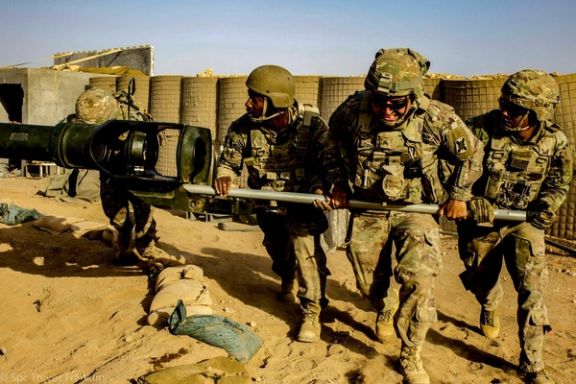
US and coalition troops have been attacked at least 40 times in Iraq and Syria by Iran-backed forces since the start of October, as tensions soar over the Gaza war. Forty-five U.S. troops have suffered traumatic brain injuries or minor wounds.
Iran has denied involvement. Tehran's ambassador to the United Nations, Amir Saeid Iravani, said on Thursday separatist groups were responding to the Israeli assault that has killed more than 10,800 Palestinians in Gaza.
"It is a natural reaction by the resistance groups. It is their own decision and by their own direction," Iravani said in an interview with CNN.
The White House rejected the ambassador's assertion.
"He stands on a real, real, real fine little pin there when he talks about coordination and not directing," Kirby responded.
"To some degree, they probably do have some measure of autonomy, but they are absolutely encouraged to do these attacks," Kirby said.
"We know that the IRGC is involved directly with helping these groups make some of the decisions that they're doing, and in fact directing some of these attacks."
When Biden assumed office in January 2021, he launched indirect negotiations with the Tehran to revive the Obama-era JCPOA nuclear accord that his predecessor had abandoned.
The talks failed to reach a new agreement, but in August Washington agreed to release $6 blocked in South Korean banks in exchange for Iran freeing 5 Americans held hostage. The deal was harshly criticized by Republicans and others as providing Tehran with money that it could use to finance its destabilizing activities in the region.
Critics also charge that the Biden administration has failed to enforce existing US sanctions and Iran’s oil exports have increased to near pre-sanctions days.
Senate Republicans introduced a bill before the October 7 Hamas attack that would make it extremely difficult for the Biden administration to lift economic sanctions imposed on Iran.
The PUNISH Act takes away the President’s executive authority to lift economic penalties until the administration can show that the Islamic Republic and its affiliated groups in the region have ceased all attempts to assassinate American officials, citizens, and Iranian nationals in the United States.
“If you want to strangle Iran, you cut off their oil,” said Republican Senator John Kennedy on Monday. “The Biden admin is choosing not to do that, and now they wonder why Iran’s proxies thought they could get away with attacking Israel and, by extension, America.”
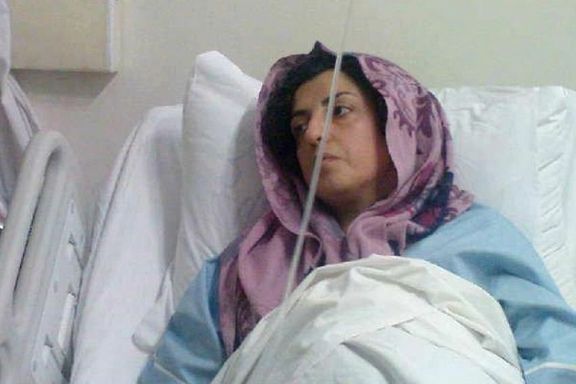
Iranian prison authorities have finally bowed to pressure to send Narges Mohammadi to hospital without her mandatory hijab after several days of hunger strike.
The Nobel Peace Prize laureate had required medical attention outside Evin Prison but was barred from heart and lung treatment for refusing to wear the Islamic headscarf.
Her family announced the hunger strike on Monday as the rights activist stood firm in her objection to the compulsory hijab, a symbol at the heart of nationwide protests since last year. By Thursday, after mounting international pressure, prison officials eventually transported her to the hospital.
In a statement on her Instagram account, the 51-year-old announced that her resistance has finally paid off, able to go to the hospital "without a headscarf and in a business suit".
Mohammadi, declared as the Nobel Peace Prize winner in 2023, is one of the most prominent advocates for women's rights globally. She has repeatedly voiced her opposition to mandatory hijab and has spent her life in and out of Iranian jails fighting for justice.
The Instagram account of Golrokh Iraee, a political prisoner in Evin, also mentioned that Mohammadi and her fellow protesters, who had initiated a hunger strike in protest against the policy of "either death or mandatory hijab" and the prevention of Mohammadi's hospitalization, have broken their strike after medical attention was provided to Mohammadi.
Iraee emphasized in her post, "Nasrin's refusal to wear the mandatory headscarf is a step towards overthrowing the hijab. The compulsion has led to the humiliation, suppression, and torture of Iranian women for more than four decades and has resulted in the deaths of many, including Mahsa Amini and Armita Geravand.”
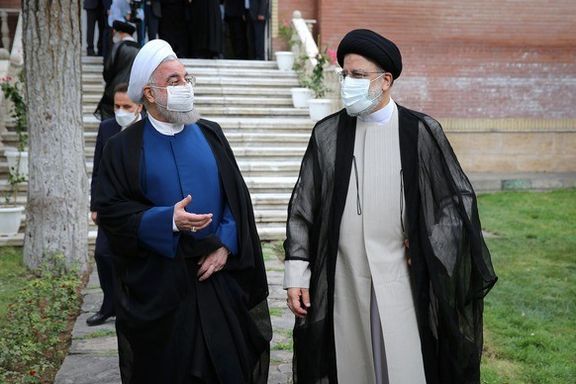
Hassan Rouhani, the ex-president of Iran, addressed the ongoing conflict in Gaza, warning that the regime's flaming of unrest is putting Iran at risk.
He emphasized the potential consequences of its being overly involved, directly or indirectly through its proxies, warning that "a mistake, a wrong decision, or an imprecise action could drag the flames of war towards us."
Rouhani highlighted a development within Iran, noting a division among the people regarding the Gaza issue, a situation he deemed “unprecedented.”
Iran-backed Hamas invaded Israel on October 7, leading to the worst conflict in the Gaza Strip since Hamas took control in 2007. Iran's proxies across the region in Syria, Lebanon, Iraq and Yemen have all since been involved as the conflict escalates, in spite of Tehran's ongoing denials of involvement.
It has created a huge divide among the Iranian population with many voicing support for Israel as it battles Iran's biggest Palestinian proxy.
Adding to the concerns, former Foreign Minister Javad Zarif warned of the possibility of war. During a gathering discussing the Palestine issue from the perspective of international law on Wednesday, Zarif expressed apprehension about the potential consequences of being drawn into the conflict between Hamas and Israel, asserting that “it would not affect the officials in power but would impact the Iranian people.”
The United States has taken a strong stance in support of its ally Israel. Following the surprise attack by Hamas on October 7 which was the most deadly single day for Jews since the Holocaust, the US has mobilized warships and troops, vowing to stand by Israel.
The allegiance has since resulted in US facilities in Syria and Iraq coming under fire from Iran's proxies.
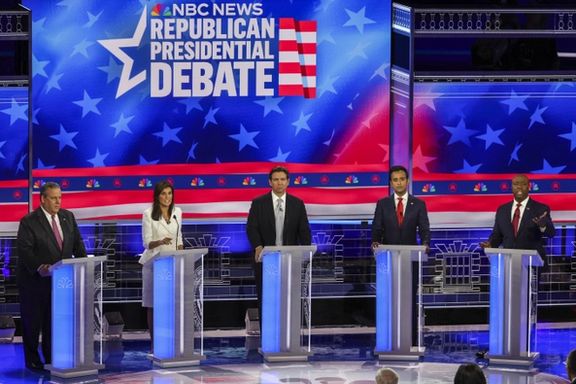
US Republican presidential candidates held another primary debate in Miami Wednesday, a session dominated by how to deal with Iran and its proxies.
Republican presidential candidates former UN Ambassador Nikki Haley and Florida Gov. Ron DeSantis led the third GOP debate with decisive plans against the Islamic Republic as all the runners were unanimous that Tehran is the head of the snake that is wreaking havoc across the Middle East and the world. Former New Jersey Gov. Chris Christie, Senator Tim Scott (R-SC) and entrepreneur-turned-politician Vivek Ramaswamy were also contenders.
Israel, the closest US ally in the Middle East, was invaded by Iran-backed Hamas militias on October 7, an operation cheered and cherished by Tehran that saw 1,400 mostly civilians slaughtered and over 240 taken to Gaza as hostages. Israel has been pounding the enclave to uproot the Islamist group, which has made the war exceedingly bloody hiding deep among the civilian population and underneath the coastal sliver’s non-military facilities. GOP hopefuls reiterated Israel’s right to defend itself against Hamas, but went further and vowed to address the issue at its core, the regime in Tehran.
Four of the five GOP presidential candidates in the debate voiced strong support for Israel in its war against Hamas, whose self-proclaimed goal is to wipe Israel off the map, with only Ramaswamy warning against the US being drawn into another war in the Middle East.
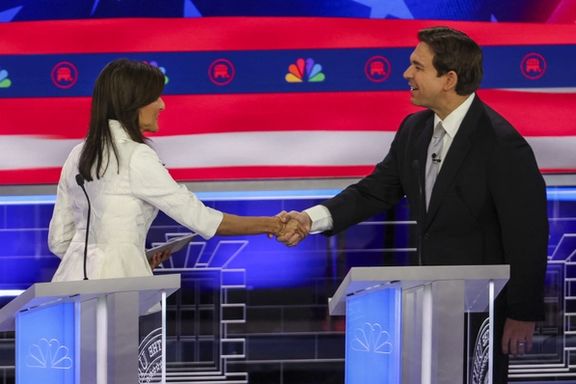
In response to a question about what he would tell Israeli Prime Minister Benjamin Netanyahu if he were president, DeSantis said, "I will tell Bibi to finish the job once and for all and destroy the butchers from Hamas." Haley said she too would not tell him anything other than to provide support to finish Hamas. “Finish them. Finish them... The last thing we need to do is tell Israel what to do," she said.
"There would be no Hamas without Iran; there would be no Hezbollah [Iran's Lebanese proxy] without Iran; no Houthis [in Yemen] without Iran; and there would not be Iranian militias in Syria and Iraq trying to hit US military men and women,” Haley said, noting that Iran is itself funded by the oil it sells to China and the drones and missiles it sells to Russia. “There is an unholy alliance.”
Answering a question on the US using military force against Iran, Haley said President Joe Biden "tiptoes" around Iran, stating that Iran will stop attacking US forces in the region only if the US uses force to prevent it. It is “unthinkable” that American forces are being hit by Iran-backed militias under Biden’s watch.
"This is Iran giving the green light... we need to go and take out their infrastructure” that enables the strikes. “Iran responds to strength, you punch them one and you punch them hard, and they will back off.”
Of around 40 attacks on US facilities since the war broke out in Gaza, the US has retaliated only twice. DeSantis also said Biden is not doing enough to protect US soldiers in the Middle East from Iranian attacks, stating that “You harm a hair on the head of an American service member and you are going to have hell to pay.”
Former New Jersey Gov. Chris Christie said to make sure Hamas, or any other Iran-backed militia group, would not threaten Israel and US forces in the region, Washington must work with its Arab allies in the region to further isolate Iran “so their only friends are the evil forces: China, Russia, and North Korea.”
Sen. Scott highlighted Israel’s “right and the responsibility” to wipe Hamas off the map, calling on Biden to be more aggressive in attacking Iranian assets. "We need to attack Iran, not just warehouses in Syria," Scott said, an apparent reference to the US airstrike on a facility controlled by the Iranian Revolutionary Guards Corps (IRGC) and affiliated groups in eastern Syria hours before the debate started.
"We need to cut the head of the snake, and the head of the snake is Iran and not simply its proxies,” he said. “Diplomacy only is a weak strategy... You cannot negotiate with evil. You have to destroy it.”
The Republican runners competed with one another to debunk the “so-called Islamophobia” and spoke out aggressively about antisemitism, vowing to deport foreign students who support Hamas and cut any federal funding to universities that are tolerating antisemitism as it surges across the US. Jewish schools and synagogues have been forced to close as hate crimes against the Jewish community are worse than has been seen in recent history.
“Let me just say to every single university president in America, federal funding is a privilege not a right,” Scott said. “To all the students on visas who are encouraging Jewish genocide, I would deport you."
In a rare show of unity, the Republican presidential candidates all drew a hard line on Iran and issued stark warnings to the Islamic Republic, who has been warning of the conflict spiraling into a larger regional war since Israel launched its retaliatory offensive on Hamas. The GOP runners’ promise is the latest in a wave of calls for a military action against Iran, which is not shy about its support for anti-Israel and anti-US sentiments and actions across the Middle East and is counting the days until the destruction of Israel as prophesied by Supreme Leader Ali Khamenei.
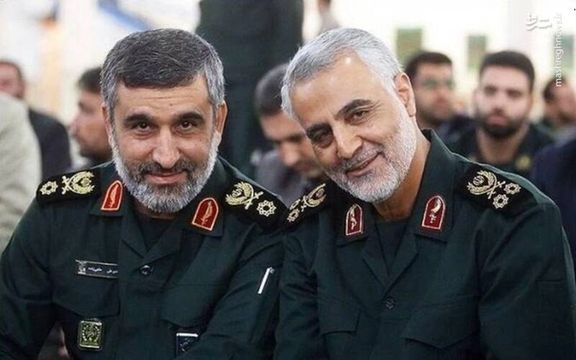
Amir Ali Hajizadeh, the IRGC aerospace commander, said that Iran decided not to wage a war to avenge the US killing of Qassem Soleimani because “it was not logical.”
A short video released by Etemadonline, an Iranian daily, shows the IRGC commander saying that a war with the US at that point could have inflicted heavy casualties on Iran, killing 10-15,000 civilians and soldiers. It would also see Iran regress for 10 to 20 years, he added.
According to Hajizadeh, the Iranian officials noted at that time that having a full-scale confrontation with the US would not be conducive to “desired results.”
This is while Tehran previously claimed that Washington called for immediate deescalation after its airstrike which claimed the life of Soleimani.
Soleimani, the Iranian regime’s top military and intelligence operator in the Middle East, was killed in a US drone strike in January 2020 in Iraq’s capital, Baghdad. He oversaw the regime’s proxies in the region.
Washington justified the action by saying that Soleimani was actively planning attacks against American diplomats and military personnel in Iraq and the broader region.
Iranian leaders have often vowed to avenge Soleimani including threatening the assassination of former US President Donald Trump, who gave the green light for the commander's death.
Speaking on the occasion of the third anniversary of Soleimani’s killing, Iranian Foreign Minister Hossein Amir-Abdollahian also said that nearly 60 US officials were blacklisted by Tehran for their involvement in the assassination of Tehran’s top commander.